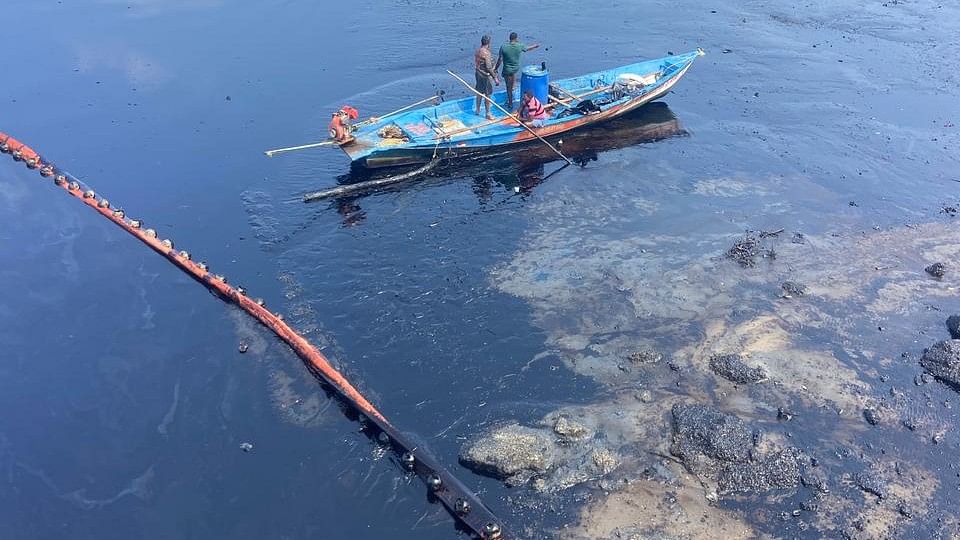
A photo showing the oil spill in the Ennore Creek area.
Credit: DH Photo/Special Arrangement
Chennai: Tamil Nadu government has deployed gully sucker machines to remove the floating oil from the ecologically-sensitive Ennore Creek area after blaming the Chennai Petroleum Corporation Limited (CPCL) refinery in Manali for the oil spill that has wrecked the lives of thousands of people, who are battling several health complications for the past one week.
Besides the machines to remove the oil, the government told the National Green Tribunal on Tuesday that containment booms have been deployed in an area of 75 metres while it will be extended to another 730 metres of area – they are being brought from the Chennai and Puducherry ports – to prevent the oil from entering the ocean.
Containment booms are primarily floating barriers designed to contain oil spill and prevent them from spreading further.
The state government, which is under criticism from the NGT and public for not being proactive on the issue, said a coordination centre has been set up by the government at Nattukuppam village to coordinate mitigation activities with several departments stationing their officials on the sites to monitor the works.
“Three gully sucker machines have been deployed in the Ennore Creek area to remove the floating oil which will be safely disposed at a designated location at Gummidipoondi which is licensed for storing hazardous waste,” Supriya Sahu, Additional Chief Secretary, Environment & Forests, said.
Some more gully sucker machines are being deployed to fasten the process, she said, adding that specialized oil cleaning agencies have been mobilized with necessary equipment to remove oil debris from affected areas.
Sahu’s statement came hours after an expert committee appointed by the Tamil Nadu Pollution Control Board (TNPCB) concluding that the oil from CPCL, a subsidiary of Indian Oil Corporation Limited, entered the Buckingham Canal which then reached the Ennore Creek in the aftermath of floods due to Cyclone Michaung.
The pollution watchdog also asked the PSU to identify hotspots where the oil deposits or oil slick are stagnated and take necessary remedial measures on a war footing basis.
The oil spill from CPCL into the flood water during the heavy rains that lashed Chennai last week has made life tough for thousands of residents and fishermen in Ennore, Ernavur, and nearby villages. While people are working overtime to clean the oil stains in their homes besides battling health issues like burning sensation in the eyes, skin issues, and headache, fishermen are not venturing into the sea as the fish catch is full of oil.
Tamil Nadu Water Resources Department and Indian Coast Guard (ICG) have acknowledged the spread of thick oily sludge along the Buckingham Canal and across the tail-end of the Kosasthalaiyar River. However, CPCL continues to deny the allegations.
The TNPCB, which had in its initial report said it only found traces of oil in the area, has now concluded that oil spillage did happen from the premises of CPCL. “The team has also noted inadequate storm water management issues in CPCL premises,” a statement from TNPCB said.
In a statement, the agency said it has asked CPCL and its secondary units and terminals to ensure that all pipelines (raw materials and products) and tanks are intact with no leakage and warned suspension of operations if the company is found to discharge oil containing water/polluted water against the norms set out for industries.
Besides being liable to pay environmental compensation for any damages caused in contravention of the extant provisions under the Water (Prevention and Control of Pollution) Act, 1974, the company will also be liable to pay compensation to the families adversely impacted due to the oil spillage including the loss of livelihood, the TNPCB said.
The agency also asked CPCL to carry out a Leak Detection & Repair Study (LDAR) with the help of a reputed technical institution and furnish the same to the Board immediately, besides shall undertake a comprehensive mapping study with a reputed technical institution to identify oil spread areas and furnish the report with action plan to the Board immediately.